A Vision for Pakistan: Insights from the Consul General on Community, Diplomacy, and Progress
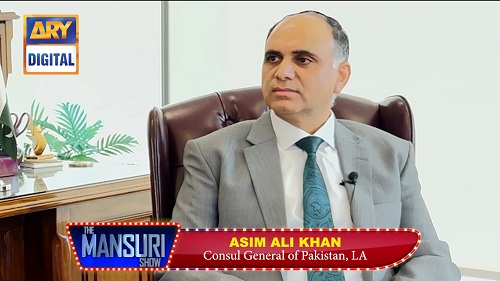
The Honorable Asim Ali Khan, Consul General of Pakistan in Los Angeles, recently granted an exclusive interview to Pakistan Link, Urdu Link, and The Mansuri Show on ARY Digital TV. The conversation took place at the Consulate General of Pakistan in Los Angeles and was conducted by Arif Zaffar Mansuri, host of The Mansuri Show and Managing Editor of Pakistan Link and Urdu Link. What follows is a detailed account of this insightful and engaging interview.
Brief Introduction: Consul General Khan is a very distinguished career diplomat with over two decades of experience in the foreign service of Pakistan. Throughout his illustrious career, he has held many key diplomatic assignments in China, the United States, Canada, and France. Before assuming his current role, he served as director general at the Foreign Ministry of Pakistan in Islamabad and held a pivotal position at the presidential secretariat. His expertise includes bilateral and multilateral diplomacy, foreign policy, economic diplomacy, and fostering community engagement around the globe. He has a master's degree in international relations and a bachelor's degree in mechanical engineering with honors. For his outstanding contribution to public service, he was awarded the prestigious Sitara-e-Imtiaz by the president of Pakistan on Pakistan Day in 2023.
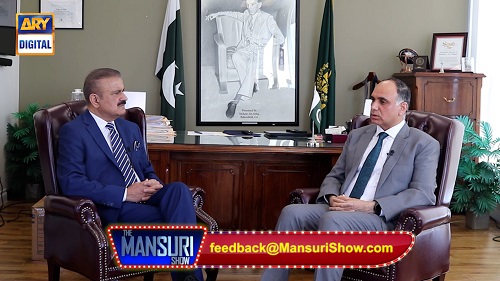
Mansuri:
Consul General Khan, I would like to begin by asking you about the Sitara-e-Imtiaz, the most esteemed award that you received. Could you please share with us the background and the efforts that led to this very distinguished recognition?
Consul General Khan:
Thank you, Mr Mansuri. I am grateful to Allah. The Sitara-e-Imtiaz was awarded to me by the President of Pakistan almost two years ago in recognition of my public service. This honor was specifically related to a significant project. Many of you might be aware that Pakistan was removed from the Financial Action Task Force's (FATF) "Grey List" in October 2022. I was part of the team that spearheaded this effort. My efforts and contribution to the project led to this recognition.
Pakistan had been placed on FATF's Grey List in 2018. Countries on this list face increased financial restrictions, making it more challenging for them to secure loans from FATF-affiliated financial institutions. This was a monumental project, requiring a nationwide, interprovincial, and intergovernmental effort with extensive coordination. A tremendous amount of work was needed, and I am very proud and grateful that we were able to achieve this for Pakistan.
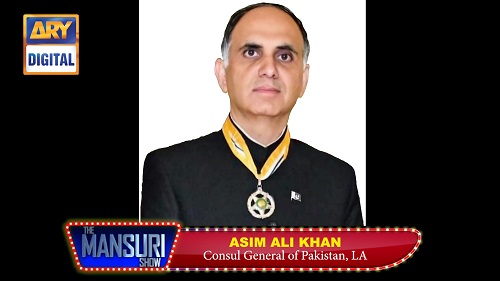
The project involved addressing specific deficiencies identified by FATF and key countries at the bilateral level in Pakistan's anti-money laundering and countering financing of terrorism framework. I worked on the countering financing of terrorism aspect, particularly in the area of targeted financial sanctions, where the Ministry of Foreign Affairs played a leading role. Additionally, we conducted a highly proactive diplomatic campaign over four years to help Pakistan achieve this milestone.
This effort was crucial for supporting Pakistan’s economy and integrating its financial system with the international financial system. We succeeded because of the high-level commitment from the government of Pakistan and sustained efforts from numerous departments and officials at both the federal and provincial levels, as well as relevant agencies. It was a significant accomplishment, and I am proud that we were able to achieve it.
Mansuri:
Over the past 22 years, you have lived abroad in several countries with different cultural settings. How have your personal experiences shaped your approach toward diplomacy?
Consul General Khan:
I have served on many continents, as you mentioned, starting in France, then moving to North America—incidentally, a couple of times—and also serving in China, along with smaller assignments in different parts of the world. Cultural understanding is crucial for a diplomat in building bridges between two countries. It paves the way for a diplomat and their country to strengthen relationships between nations.
When we immerse ourselves in different cultures and develop a deeper understanding, it not only enhances political relationships but also fosters collaboration, economic cooperation, and other areas of mutual interest. To truly understand a culture, mutual respect is essential. For a diplomat, it requires empathy, effective cultural communication, and adherence to the diplomatic norms of respecting and appreciating diverse cultures while seeking common ground. This mutual respect fosters mutual benefits across cultures. When relationships are developed at the cultural level—between people and societies—it significantly contributes to strengthening relations between countries at both the state and political levels.
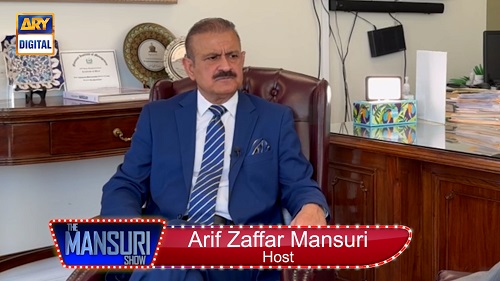
Mansuri:
Please share with us some insight into your role as the consul general of Pakistan in Los Angeles and how you navigate the challenges in fostering the relationship between Pakistan and the United States.
Consul General Khan:
Consulate general of Pakistan in Los Angeles was established almost three decades ago to serve the Pakistani American community on the west coast of the United States. We have a responsibility to serve the community and safeguard Pakistan's interests on the west coast. It's a big country and 10 states on the west coast are under our area of responsibility. The first challenge is to navigate through this vast geographical territory, which is almost half the size of the European Union. We have a concentration of the Pakistani American community in the state of California and relatively smaller clusters in the states of Washington, Arizona, Nevada, Utah, and other states under our area of responsibility. To cover this whole area, it needs a lot of commitment and hard work and a lot of coordination and commitment of time and resources for us. Luckily, we have a very patriotic and very enterprising and dynamic Pakistani American community.
And that helps us. They work with us as partners. Our primary job is to promote Pakistan's interests in this part of the world and we consider the Pakistani American community as a major partner and stakeholder in that. Secondly, Pakistan has improved its consular services for the community and brought them at par with the international level. Our consular services are mostly online and offered digitally. We are providing services to the community at their doorstep or at their homes. For most of the services, the community doesn't have to visit the consulate. They can apply for different services, their travel documents and other documents from their own locations. This has eased our work and helped us in focusing our attention on the economic diplomacy. So challenges as they come up, we try to overcome them by re-strategizing and changing our strategy. So now our focus, as I said, has shifted to economic diplomacy and public diplomacy. In the past, it used to be on improving the standards of consular services because majority of services in the past were through manual processes.
Mansuri:
So, can the visa and passport renewal services be completed online without visiting the Consulate in person?
Consul General Khan:
Yes. Almost all services, including passport renewals, new passport applications, visa applications, attestations, and various types of certificates, are now available online. This reflects the good governance that Pakistan has established over time. I would proudly say that our consular services are superior to those offered by many of Pakistan's counterparts. Public reviews, which are readily available online, also affirm that the services we provide meet high standards. Our approach is people-centric, ensuring that we promptly address feedback, complaints, requests, or any issues and concerns raised by the community.
We strive to be responsive, transparent, timely, and proactive in our efforts so that people experience a high level of satisfaction with our services. The very purpose of this office is to ensure that Pakistanis on the West Coast of the United States remain connected to Pakistan and receive the quality of services they rightfully deserve.
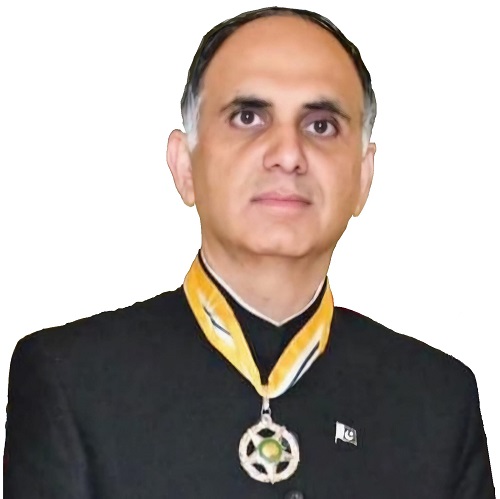
Mansuri:
How do you see the evolving dynamics between Pakistan and the United States in terms of the bilateral relations?
Consul General Khan:
Pakistan-US relations are almost as old as Pakistan itself, and this is a very important relationship for us. Pakistan attaches a high degree of importance to its bilateral relationship with the United States, ranking it among the most significant relationships we have with major countries worldwide. This is not just an old relationship; it is a vital and, in many ways, strategic partnership.
Pakistan is a major non-NATO ally of the United States and has remained a strategic partner. Our relationship is broad-based, longstanding, and has experienced ups and downs over the years due to geopolitical factors, regional dynamics, and the shifting priorities of both nations. However, overall, the relationship has maintained a positive trajectory.
I would say the areas of convergence in this bilateral relationship outweigh the differences or divergences. When there are more convergences than divergences, it indicates a positive and constructive relationship that is on the right track. That said, the level of engagement and its intensity have varied in the past, influenced by the national interests of both countries and changing geopolitical circumstances.
Despite these variations, Pakistan views this relationship as highly significant, and we remain committed to further strengthening and improving it.
Mansuri:
What do you consider the most important aspect of diplomacy and how do you view the current global challenges?
Consul General Khan:
In the past, when diplomacy was very different, it primarily took place between states. I’m referring to the era before the information and communication technology revolution when governments were the sole channel of communication between states. Embassies and consulates were the only or predominant channels of communication, and diplomacy was conducted in a very different manner.
Now, with the advent of multiple channels of communication—people-to-people communication, traditional media, social media, and the resulting information overload—diplomacy has also evolved, and so has Pakistan’s approach. State-to-state diplomacy through official diplomatic channels remains one strand, but we have increasingly focused on public diplomacy.
Public diplomacy involves engaging with people, cultivating relationships with the public, and making diplomacy more people-centric by considering the public as vital stakeholders in strengthening relations between states.
As I mentioned earlier, the Pakistani community in the United States, which is almost a million strong, is considered a crucial partner under the umbrella of public diplomacy. Their involvement is instrumental in improving the relationship between the two countries. This shift toward public diplomacy represents a significant change over the last two decades.
Under this framework, cultural diplomacy has also emerged as an essential aspect of fostering stronger ties. You asked earlier about the importance of cultural communication and cultural diplomacy, and it is now one of the key tools in building relationships, alongside public diplomacy and social media diplomacy—areas that were not priorities two decades ago.
Additionally, due to improved governance in Pakistan, the digitization and modernization of consular services by embassies and consulates, and a greater focus on efficiency, we have shifted our emphasis toward economic diplomacy. This has become one of the top priorities of the Government of Pakistan, with clear instructions to our embassies, including those in the United States, to focus on contributing to solutions for Pakistan’s economic challenges.
We are reorienting ourselves to this end, and I would like to thank your show and media channel for highlighting the role of the Pakistani community. They are important partners in public diplomacy, cultural diplomacy, and economic diplomacy. Strengthening economic relations with the United States relies heavily on the support and engagement of the community. The bridges they build between the two countries are strong, and with their continued contributions, economic cooperation can be further enhanced.
Mansuri:
You mentioned cultural diplomacy. I understand that you attended a recent screening of the Glassworker, Pakistan's first-ever hand-drawn animation film. How important are these cultural events in promoting understanding of Pakistan's rich cultural heritage in the United States?
Consul General Khan:
Pakistan is one of the oldest civilizations. Although Pakistan as a country is relatively new, being only seven or eight decades old, the people of Pakistan inherit a heritage and civilization that is among the oldest in the world—the Indus Valley Civilization.
When we say we have inherited this civilization, it signifies Pakistan's unmatched cultural diversity, richness, and beauty. This is something we aim to showcase globally through our various diplomatic efforts, including public and cultural diplomacy. As part of these efforts, we emphasize that Pakistan's rich and diverse heritage is something to be celebrated. We also warmly invite our American friends to visit Pakistan and witness this diversity and beauty firsthand.
In recent years, Pakistani culture has also been influenced by technological advancements and global trends. The Glassworker, which you mentioned, is a remarkable project by a highly enterprising producer and director, Usman. This movie, created over a span of 10 years through immense dedication, is an impressive example of blending traditional cultural elements with modern storytelling and animation.
I have attended screenings of The Glassworker, which drew large and diverse audiences. We are immensely proud that it is being considered for Oscars in two categories: Best Feature Film and Best Animation. The shortlist for the Animation category will be announced in a few days, and we remain hopeful for recognition. We have engaged in some lobbying to promote The Glassworker as a pioneering effort, and we believe it will inspire many young Pakistanis to promote the country's culture worldwide, not only through traditional mediums but also through technology.
This is an exemplary initiative, and we fully support such efforts. You may recall that in July last year, the consulate organized one of the pioneering cultural events, in which you were also a part.
We brought together a group of Pakistani producers, directors, actors, and writers, along with their counterparts from Hollywood, to foster connections and build bridges between the entertainment and media industries of both countries. This is an ongoing effort, and we plan to organize a Pakistani film festival either later this year or early next year. These efforts are crucial because Pakistani culture is incredibly beautiful, rich, and diverse, and it deserves greater exposure to the world. Significant efforts are needed to achieve this, and we are committed to playing our part. We are fortunate to be in a city like Los Angeles, known as the heart of Hollywood and the Western entertainment industry. This gives us a unique advantage, and we continue to leverage these resources. Additionally, some members of the Pakistani community have been very helpful and supportive in these initiatives, and their contributions are deeply appreciated.
Mansuri:
You recently organized Pak-US Tech Investment Conference in November 2024 at the Stanford University. How do you envision the future of the tech collaboration between Pakistan and the United States?
Consul General Khan:
Pakistan has a robust trade relationship with the United States in traditional sectors such as textiles, sports goods, leather, surgical instruments, and more, with bilateral trade amounting to almost $8 billion. However, exports in services, particularly IT services and products, are witnessing significant growth. Out of Pakistan’s $3.2 billion IT exports, a major portion goes to the United States, with a significant share directed to California. California represents a substantial market for Pakistan's IT industry, encompassing both services and products, largely due to its proximity to Silicon Valley.
A few months ago, we planned an event to tap into this potential, with support from local departments, organizations, and the growing Pakistani tech community in the United States. Our key partners in Pakistan included the Ministry of IT, Pakistan Software Export Board, the Ministry of Commerce, and other relevant departments. Under the leadership of our ambassador in Washington, we successfully organized this initiative.
The recent tech conference at Stanford University marked a significant milestone. Hosting a single-country exhibition in Silicon Valley for a full day—seven to eight hours with over 200 attendees actively engaged—is a unique accomplishment. The event focused on exploring how Pakistan and US tech ecosystems could collaborate more effectively.
Pakistan produces 30,000 to 40,000 IT graduates annually, with IT exports growing at an impressive rate of 25% over the last few years, a trend expected to continue. Pakistan also boasts the third-largest pool of IT freelancers in the world. Our young, dynamic population is increasingly pursuing IT studies in universities, supported by government policies and ambitious targets to expand IT exports. The government has set an ambitious goal to increase IT exports to over $20 billion in the next few years.
The Stanford conference served several key purposes:
- Country Branding: It showcased what Pakistan offers in the tech industry, marking a unique government-level effort after a long time.
- Networking Platform: It provided an opportunity for members of the Pakistani tech community in the US, particularly on the West Coast, to connect with one another.
- Project Presentation: Specific IT projects were presented, with participation from Pakistani startups and the Pakistan Software Export Board. The Minister for IT also addressed the audience. Notably, two Pakistani entrepreneurs based in California announced an initial $20 million investment in Pakistan’s IT sector—a promising start that could inspire further investments and collaborations.
Pakistan’s increasing participation in major tech events like TechCrunch and the Game Developers Conference underscores our growing engagement with Silicon Valley. We plan to organize more such events in the future, focusing on different tech sub-ecosystems in the US, with a strong reliance on the Pakistani-American tech community.
These efforts are not just driven by patriotism but by mutual benefit, as Pakistan offers tangible returns in the IT sector. Beyond cost competitiveness, Pakistan provides quality competitiveness, positioning itself as a reliable and valuable partner in the global tech ecosystem.
Mansuri:
Your consulate represents 10 western states, and you are highly accessible and very popular within the community. I see you at nearly every major community event. You are married and have three children, so I’d like to ask: how do you balance your personal life with such a demanding workload and your commitment to family life? How do you manage to strike this balance?
Consul General Khan:
This is an important but challenging question to answer. Ideally, everyone strives for a work-life balance. However, when you have a commitment and responsibility, particularly in a role like this, which is not just a duty but a privilege, it becomes a challenge to meet the demands of the position.
As I mentioned, we adopt a people-centric approach, striving to engage with the community wherever it benefits them or serves Pakistan’s interests. I am deeply grateful to the Pakistani community for their respect and recognition, which stems from their love for Pakistan. Through these interactions, I have also built personal friendships and have made a conscious effort to remain accessible and proactive.
We leverage social media and electronic communication tools to supplement physical interactions. While we focus on in-person engagement in California, given the vast jurisdiction we cover across 10 western states, we rely heavily on social media to reach out to the community in other areas. If there are parts of our jurisdiction where we have not yet been able to engage, we would greatly appreciate your support in connecting us to those communities. Through your platform, I request all Pakistani-American community members to reach out to us. For non-emergency cases, email is the best way to contact us. However, for emergencies, such as urgent travel assistance, our phone numbers are available, and we encourage people to contact us directly.
Balancing these responsibilities is undoubtedly difficult, but I am thankful to my family for their understanding and cooperation. They recognize the demands of this profession and view this role as a privilege. Representing Pakistan in this capacity allows us to engage in diplomacy that focuses on collaboration, partnerships, dialogue, and cultivating positivity. It is through this approach that we aim to foster stronger ties with the community and promote Pakistan’s interests.
Mansuri:
Looking ahead, what are some of the goals that you would like to achieve during your tenure in Los Angeles, and how do you envision leaving a lasting impact
Consul General Khan:
Under different areas or segments of diplomacy, what are we tasked with undertaking? The first and foremost is consular services. This is a constant area of effort where we aim to improve day by day—maintaining high standards, minimizing complaints, ensuring responsiveness and transparency, and providing services to the community. While adhering to the rules, we strive to facilitate the community as much as possible. This remains one of our major goals.
The second major area is economic diplomacy. This involves creating more economic opportunities for Pakistan in this country. It also means supporting the community in fostering integration, unity, and harmony among themselves. We work to unite people and facilitate their initiatives to support Pakistan's socio-economic sector. I am particularly impressed by the Pakistani community in California, which organizes numerous fundraisers every year to support hospitals, schools, and the social sector in Pakistan. We actively support these efforts and aim to sustain the community’s connection with Pakistan and their motivation to contribute to Pakistan’s socio-economic development, complementing the government’s efforts.
The third critical area is improving Pakistan's image in the Western world, including the United States. Pakistan is a great country with a heritage that spans centuries—indeed, millennia. It stands for many positive contributions to the world, and these stories need to be told. Pakistan has played a pivotal role not just in the region but globally, supporting various causes and maintaining peace and security in South Asia and other parts of the world.
For instance, Pakistan has been one of the largest contributors of troops to United Nations peacekeeping missions for decades, with at least 10,000 troops deployed at one point. When I was working at the UN desk in the Ministry of Foreign Affairs a few years ago, Pakistan was the highest contributor to UN peacekeeping missions. Sending such a significant number of troops, along with equipment, into challenging war zones to maintain peace and security demonstrates Pakistan’s remarkable commitment.
Additionally, Pakistan has made tremendous sacrifices in its fight against terrorism, losing over 90,000 lives. This monumental sacrifice underscores Pakistan’s dedication to global peace and security. These are hard facts that must be shared and acknowledged.
Pakistan’s commitment extends beyond its region. Our active role in the United Nations is a testament to this. I would like to share through your platform that, Alhamdulillah, Pakistan has begun its non-permanent membership on the United Nations Security Council as of yesterday, a term that will span the next two years. Pakistan will play a significant role in promoting peace and security in challenging regions around the globe. This level of engagement requires immense dedication and effort, and Pakistan is firmly committed to these ideals.
Moreover, Pakistan remains devoted to its socio-economic development, stability, and addressing the challenges faced by its people. The embassy and consulate are integral to these efforts, working under the government’s policies and direction to implement initiatives that further these goals.
Mansuri:
I would like to request your opinion or comments regarding our newspaper, Pakistan Link and Urdu Link. In fact, when you first joined the consulate, Pakistan Link had the privilege of being the first to interview you. I would be much obliged if you could share your thoughts about the newspapers.
Consul General Khan:
Let me first thank you for keeping Urdu Link and Pakistan Link alive in this age of social media, digital technologies, and websites, where people increasingly rely on electronic devices and social media for news rather than traditional legacy media. I am truly grateful to you for maintaining these platforms and preserving the name Pakistan Link. Your continuous efforts reflect your unwavering commitment to uniting the community and providing them with a platform—not only in California but across the United States and even beyond.
Let me share an observation from 20 years ago when I was on my first diplomatic assignment in Canada. At that time, in Toronto alone, there were at least seven or eight major newspapers. I remember receiving hard copies of those Urdu newspapers regularly. Back then, very few people read the news on screens, whether on computers or mobile phones.
The world has changed since then, and traditional media, including Urdu newspapers and Pakistan-related publications, are steadily fading away. Many of these outlets in this country have already shut down. However, your dedication to keeping your newspaper and media platform alive is truly commendable.
I sincerely urge you to continue this important work to connect the community, provide them with a platform, and share news about Pakistan, as well as updates on the activities and achievements of the Pakistani community. Your efforts are invaluable and greatly appreciated.
Mansuri:
Finally, I would like to ask if you would like to convey a message to the community through our program, The Mansuri Show on ARY Digital TV, as well as through the newspapers Pakistan Link and Urdu Link.
Consul General Khan:
My message to the community is to remain positive, optimistic, and hopeful about Pakistan. Pakistan is on the right path and has a bright future, which is evident through its progress in the fields of economy, information technology, and macroeconomic stabilization over the past few months. These developments indicate that Pakistan’s economy is being reformed and established on a solid foundation.
The recent announcement by the Government of Pakistan regarding the economic package for the next five years, named Udan Pakistan, reflects the government’s commitment to ushering in a new era of socio-economic development.
So, remain positive about Pakistan, stay connected to it, and make an effort to visit Pakistan. Encourage your children and American friends to visit as well, so they can see for themselves what Pakistan has to offer. It is a beautiful and great country. Your support and firm belief in Pakistan will play a vital role in propelling it forward in this century.
To watch the complete interview, visit: www.YouTube.com/@MansuriShow .

